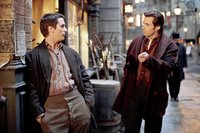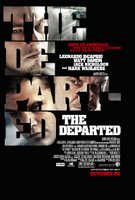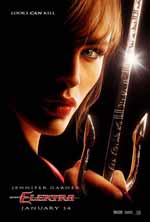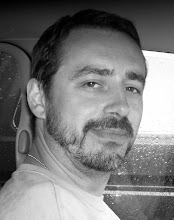 The co-writer/director and two of the cast members of Batman Begins reunite for The Prestige, filling the gap before production begins on The Dark Knight with a darkly lyrical tale of an obsessive psychological clash between two rival magicians in 19th century London.
The co-writer/director and two of the cast members of Batman Begins reunite for The Prestige, filling the gap before production begins on The Dark Knight with a darkly lyrical tale of an obsessive psychological clash between two rival magicians in 19th century London.Rupert Angier (Hugh Jackman) and Alfred Borden (Christian Bale) begin the story as assistants to a run-of-the-mill magician. They come under the tutelage of a designer of magic tricks, Cutter (wonderfully played by Michael Caine). Cutter is like a 19th century Q, designing the complex mechanistic gadgets that produce the illusion of magic. The working-class Borden and the classy Angier fall out over a stage accident, and begin the rivalry that will dominate their lives. The story unfolds in an almost epistolary fashion, through two layers of flashback from the journals of the two magicians. Two quests dominate their obsession: the search for revenge, and the pursuit of the perfect magic trick.
Director Christopher Nolan has once again assembled a top-notch cast. Jackman applies his considerable charisma, yet shades it with some ambiguity, while Bale takes his psychological intensity and humanizes it. The result is that there is no clear-cut white hat/black hat split between protagonist and antagonist; each have admirable and deplorable qualities and both allow themselves to be drawn into a wasteful battle of wills. Michael Caine completes the main trifecta of characters with another turn as an older, wiser tutor and plays it so well that the repetition is forgiven. A rich roster of supporting performances, including a hard-to-recognize David Bowie, lend interest and dramatic weight, with Andy Serkis for once not acting in a motion-capture suit.
Between this film and Batman Begins, Nolan obviously has a fondness for a sepia-brown colour palette and uses it to great visual effect in the London scenes. Most scenes are darkly lit, reflecting a time when the night was only partially penetrated by gaslight, while several sequences set in a snowy town in America have an almost ethereal beauty. Cinematographer Wally Pfister has worked with Christopher Nolan on all of his films since Memento, and the result is a unique visual signature that rivals the look of Ridley Scott’s films, with whom Nolan shares the ability to create a believable, memorable cinematic world.
A marvel of production design, the sets of The Prestige are immensely textured and detailed. Look closely in the frame of any shot, and there’s some small detail to absorb, whether it’s a piece of magical machinery in a magician’s workshop or a pillar in a grimy street covered top to bottom with period handbills. The various magical gadgets of wood and steel and spring, whether strapped to the magician’s back or concealed as part of the stage, lend baroque but convincing detail. They almost look like some genuine relic you would see presented in a glass case at a museum. Some of the fantastical machines, especially those constructed by Nikola Tesla (David Bowie), are reminiscent of the spark-plasma lab equipment featured in the old Universal Frankenstein movies, a comparison that is cemented with the final shot of the film, which also recalls the Hammer Films’ Frankenstein movies, in particular a striking visual parallel to Terence Fisher’s The Revenge of Frankenstein (1958).
The meticulous design conjures a tangible sense of place and time that few period dramas achieve and mixes it up with an old-school mad scientist vibe that embodies the film’s distinction between a magician (illusionist) and a wizard (capable of genuine magic). In this vein, The Prestige also juxtaposes magic produced by apparent supernatural means and that resulting from science, and posits a world poised on the brink of rapid and staggering technological change that still has a thirst for magic.
 Like the great magic tricks that are the subject matter of its plot, The Prestige is gloriously entertaining while the mechanics of a dexterous cinematic machine tick quietly away beneath the surface to produce some surprising narrative sleight of hand. The film ends in a plot reveal that turns out to have been carefully laid down, by dropping hints and clues along the way, with no cheating. So if a viewer figures it all out they have had to pay attention and use their minds to do so, and if not, they do not feel cheated. The Prestige may lack true substance, but it is a skillfully crafted and undeniably entertaining construction.
Like the great magic tricks that are the subject matter of its plot, The Prestige is gloriously entertaining while the mechanics of a dexterous cinematic machine tick quietly away beneath the surface to produce some surprising narrative sleight of hand. The film ends in a plot reveal that turns out to have been carefully laid down, by dropping hints and clues along the way, with no cheating. So if a viewer figures it all out they have had to pay attention and use their minds to do so, and if not, they do not feel cheated. The Prestige may lack true substance, but it is a skillfully crafted and undeniably entertaining construction.---
Directed by Christopher Nolan
Written by Jonathan Nolan and Christopher Nolan, from the novel by Christopher Priest
Starring:
Hugh Jackman....Rupert Angier
Christian Bale....Alfred Borden
Michael Caine....Cutter
Piper Perabo....Julia McCullough
Rebecca Hall....Sarah
Scarlett Johansson....Olivia Wenscombe
Samantha Mahurin....Jess
David Bowie....Nikola Tesla
Andy Serkis....Alley




